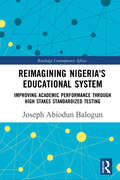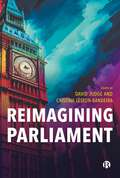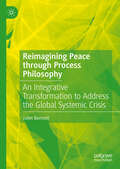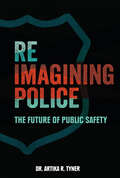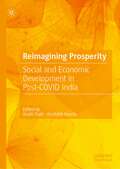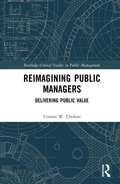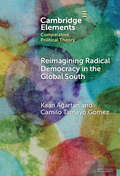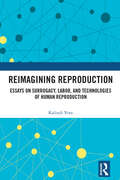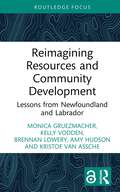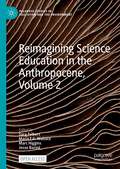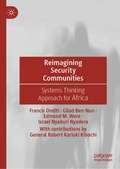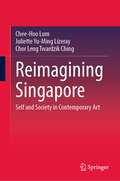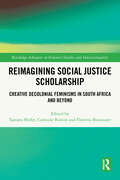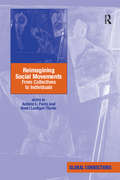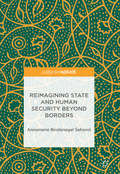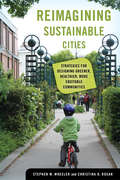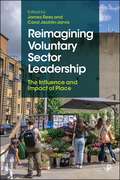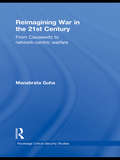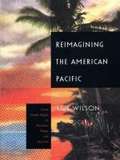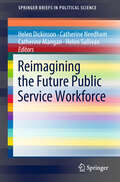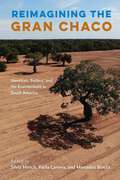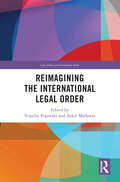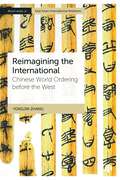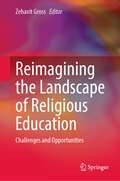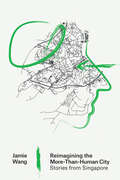- Table View
- List View
Reimagining Nigeria's Educational System: Improving Academic Performance Through High Stakes Standardized Testing (Routledge Contemporary Africa)
by Joseph A. BalogunThis book assesses the challenges within the Nigerian educational system and provides a concrete plan to revitalize the low-performing system by strengthening high-stakes testing at all levels. In Nigeria, many citizens believe that the solution to the country’s low performance in education is to eliminate high-stakes standardized testing. High-stakes testing refers to applying standardized student achievement tests as a primary mechanism to evaluate students, teachers, and their school’s performance. This book argues that the poor quality of education and low ranking of Nigeria’s educational system is not related to the negative consequences of high-stakes testing, but rather is due to many intrinsic factors. By conducting a comparative analysis of six high-performing education systems worldwide, the book offers a comparative summative evaluation of the educational system and offers recommendations. This book will be of interest to policymakers and scholars in the fields of African education, higher education, quality and global studies, African studies, management and administration, leadership, and professional development studies. Joseph Abiodun Balogun is former Dean and retired Distinguished University Professor at the College of Health Sciences, Chicago State University, USA, Visiting Professor/Program Consultant at the Centre of Excellence in Reproductive Health Innovation, University of Benin, Nigeria, and President/ CEO, Joseph Rehabilitation Center, Tinley Park, Illinois, USA.
Reimagining Parliament
by David Judge and Cristina Leston-BandeiraWith trust in Parliament and politicians at a seriously low level, there is an increasing need to rebuild our public institutions. This innovative book questions what Parliament should be in the 21st century and how it can be reimagined. It shows how a new democratic parliamentary space can be created to better represent and engage with citizens; to furnish a safe, inclusive and fair working environment for all staff and members; and to secure greater responsiveness and accountability of government. Bringing together a vibrant group of parliamentary scholars and practitioners, it proposes an institutional world of possibilities beyond the present Westminster village, to help restore faith in democracy. .
Reimagining Peace through Process Philosophy: An Integrative Transformation to Address the Global Systemic Crisis
by Juliet BennettThis book explores the ways in which process philosophers extend and strengthen peace scholars’ outlines of a paradigm of/for peace. It then illustrates the value of such a peace paradigm through the example of the climate breakdown, showing how process thinking and process metaphysics intervene at the roots of a global systemic crisis. In doing so, it articulates a new inroad to process philosophy, and illuminates an integrative intervention in the systemic crises of climate change and global inequality. The “static-process framework” developed in this book makes the philosophy of Alfred North Whitehead and the fields he has inspired easier to grasp, and offers a tool to assist in the application of process thought to a multitude of issues. This framework depicts tensions between two modes of thought—static and process thinking—according to five “basic orientations”: abstract/context, closed/open, isolating/relational; passive/generative; one/multi-dimensional. This pattern is mapped across the domains of metaphysics, economics, politics and as the basis for a new mode of living and organising across multiple layers of society.
Reimagining Police: The Future of Public Safety
by Artika R. TynerLarge-scale protests, marches, and demonstrations in cities all over the globe have followed high-profile fatal encounters involving law enforcement and people of color. Citizens have taken to the streets and demanded answers to the chronic problems of police violence and lack of accountability, particularly at the intersection of law enforcement and race in the United States. Many have demanded reform, defunding, and even the outright abolishment of police departments. How did we get here? And what does the future of public safety look like? US police forces took shape in colonial times when private groups sought to suppress Indigenous peoples, enforce slavery, and preserve the economic interests of the ruling class. Law enforcement and the societies it serves have evolved since, but the dark roots of policing have endured, resulting in centuries of historical pain and trauma in Black and other communities of color. In Reimagining Police, Dr. Artika R. Tyner explores this troubled past and present, as well as the underlying problems of a flawed criminal justice system and unjust social structures. By examining various alternative policing models—and addressing systemic societal issues such as breaking the poverty cycle, instituting restorative justice, and investing in education and community resources—Tyner debunks the misconception that calls for change are anti-police, while offering hope for a more harmonious future between law enforcement and the people it swears to protect and serve. Tyner encourages readers to get involved in this difficult conversation and to feel empowered to lead social change that helps build safe and strong communities.
Reimagining Prosperity: Social and Economic Development in Post-COVID India
by Amitabh Kundu Arash FazliThis book explores the second-order effects of the COVID-19 pandemic on social and economic development in India. The chapters in this volume provide theoretical perspectives and empirical insights from a range of disciplines including history, economics, water management, food and nutrition security, agriculture, rural management, public health, urbanization, gender studies and development of the marginalized. It discusses the pressing questions that have been raised by the disruption caused by the pandemic and proposes insights and interventions to build a more just, sustainable and united post-COVID India.
Reimagining Public Managers: Delivering Public Value (Routledge Critical Studies in Public Management)
by Usman W. ChohanPublic value theory speaks to the co-creation of value between politicians, citizens, and public managers, with a focus on the public manager in terms of her contributions, initiatives, and limitations in value creation. But just who are public managers? Public value regularly treats the "public manager" as synonymous with bureaucrat, government official, civil servant, or public administrator. However, the categories of public managers represent a more versatile and expansive set of agents in society than they are given credit for, and the discourse of public value has typically not delved sufficiently into the variety of possible cadres that might comprise the "public manager." This book seeks to go beyond the assumed understandings of who the public manager is and what she does. It does so by examining the processes of value creation that are driven by non-traditional sets of public managers, which include the judiciary, the armed forces, multilateral institutions, and central banks. It applies public value tools to understand their value creation and uses their unique attributes to inform our understanding of public value theory. Tailored to an audience comprising public administration scholars, students of government, public officials, practitioners, and social scientists interested in contemporary problems of values in society, this book helps to advance public administration thought by re-examining the theory’s ultimate protagonist: the public manager. It therefore constitutes an important effort to take public value theory forward by going "beyond" conceptions of the public manager as she has thus far been understood.
Reimagining Radical Democracy in the Global South: Emerging Paradigms from Colombia and Türkiye (Elements in Comparative Political Theory)
by Kaan Ağartan Camilo Tamayo GomezRadical democracy informs contemporary social movements both as critique of existing liberal democratic social orders and as inspiration for collective action to challenge power structures. However, existing approaches on the relationship between radical democracy and social movements often truncate complex socio-political issues, constraining political imagination and stifling 'truly radical' alternatives. This Element offers an analysis of contemporary social movements in Colombia and Turkey to show the limits and potential of radical democracy to reimagine new expressions of citizenship and non-capitalist alternatives. It argues that there is a mismatch between the radical democratic paradigm as it is formulated within Eurocentric purview, and the ways it has been articulated and practised by anti-austerity and pro-democracy movements of the twenty-first century. We propose that radical democracy should be rethought in light of novel forms of political activism and visions emerging from these social movements as a response to the failures of liberal democracy.
Reimagining Reproduction: Essays on Surrogacy, Labor, and Technologies of Human Reproduction
by Kalindi VoraThis book presents an ethnographic study on gestational surrogacy in India. It frames the ethnography of the surrogacy clinic in conversation with concerns raised in the arenas of law, policy, medical ethics, and global structural inequality about the ethics of transnational assisted reproductive technology (ART) practices. Engaging ethical discourses that both advocate for and trouble the subject of reproductive rights that remains of interest in feminist studies, the volume takes up the work of critical feminist, anthropological and science studies scholarship in India, the United States, and Europe concerned with reproductive technologies. Based on fieldwork and archival sources, the volume will be of great interest to scholars and researchers of ethnography, gender, social and public policy, South Asian studies, and global public health, especially reproductive health.
Reimagining Resources and Community Development: Lessons from Newfoundland and Labrador (Earthscan Studies in Natural Resource Management)
by Kelly Vodden Kristof Van Assche Monica Gruezmacher Brennan Lowery Amy HudsonThis book analyzes the experiences of communities facing major challenges relating to resource dependency and community sustainability, drawing on specific examples from the Canadian province of Newfoundland and Labrador. It offers a methodology of self-analysis for communities facing similar challenges, inspired by the ups and downs, local strategies for self-analysis, and collaborative work toward new futures in this Canadian province.Life in hundreds of small coastal settlements revolved around the cod fishery, until the fishery was no more viable. Communities have had to rethink their strengths, reconsider their assets, and imagine potential futures in the wake of events such as colonization and the collapse of the fishing industry. Their experiences are relevant for other parts of the world where formerly central resources are depleted or lose their value, and communities face the need for transition. The capacity to imagine different futures is rooted in the ability to critically consider strengths and weaknesses alike. The authors skillfully dissect and illuminate the conditions that can enable the reconsideration of local assets and narratives, toward a more sustainable future. The variety of these conditions, ranging from social memory to public debate, policy tools and institutional capacity, decision arenas, paths for participation, and distributed strategic leadership, are laid out clearly and illustrated vividly through vignettes written by individuals who participated in the events described. This book culminates in a flexible yet clearly structured method of self-analysis, useful for communities interested in rethinking their strengths and working toward new futures.This book will appeal to students, scholars, and professionals interested in community development and redevelopment and offers a new understanding of the mechanics of local and regional resilience
Reimagining Science Education in the Anthropocene, Volume 2 (Palgrave Studies in Education and the Environment)
by Jesse Bazzul Marc Higgins Maria F. G. Wallace Sara TolbertThis volume, a follow up to Reimagining Science Education in the Anthropocene (2021), continues a transdisciplinary conversation around reconceptualizing science education in the era of the Anthropocene. Drawing educators from many walks of life and areas of practice together in a creative work that helps reorient science education toward the problems and peculiarities associated with this contemporary geologic time. This work continues the mission of transforming the ways communities inherit science and technology education: its knowledges, practices, policies, and ways-of-living-with-Nature. Our understanding of the Anthropocene is necessarily open and pluralistic, as different beings on our planet experience this time of crisis in different ways. This second volume continues to nurture productive relationships between science education and fields such as science studies, environmental studies, philosophy, the natural sciences, Indigenous studies, and critical theory in order to provoke a science education that actively seeks to remake our shared ecological and social spaces in the coming decades and centuries. This is an open access book.
Reimagining Security Communities: Systems Thinking Approach for Africa
by Gilad Ben-Nun Francis Onditi Edmond M. Were Israel Nyaburi NyaderaThis book utilizes a systems thinking perspective to propose a holistic framework of analysis and practice for the regional security community (“RSC”) arrangement in Africa. In responding to the challenge of improving effectiveness of response to peace and security threats, African states tend to rely on ad hoc mechanisms. However, this approach has been mired with a myriad of structural limitations. The holistic framework reconfigures the traditional “RSC” into a simplified tool kit of “resources”, making this text book ideal for students and advanced researchers in international relations, and all those concerned with regional security and strategic studies.
Reimagining Singapore: Self and Society in Contemporary Art
by Chee-Hoo Lum Juliette Yu-Ming Lizeray Chor Leng Twardzik ChingThis book approaches the subject of contemporary art by exploring the social embeddedness and identities of Singaporean artists. Linking artistic processes and production to both personal worlds and wider issues, the book examines how artists negotiate their relationships between self and society and between artistic freedom and social responsibility. It is based on original research into the discourses and artistic practices of local artists, with a special focus on emerging artists and artists whose work and perspectives engage with questions of identity. Reimagining contemporary Singapore and their place within it, artists are asserting their multiple and heterogeneous self-identities and contesting hegemonic norms and notions, as they negotiate and adapt to the world around them. This book is relevant to students and researchers in the fields of cultural studies, media studies, art, sociology of art, arts education, and race and ethnicity studies.
Reimagining Social Justice Scholarship: Creative Decolonial Feminisms in South Africa and Beyond (Routledge Advances in Feminist Studies and Intersectionality)
by Floretta Boonzaier Tamara Shefer Carmine RustinShowcasing creative decolonial feminist and critical social justice scholarship, located in a South African context, this book works across modalities and disciplines, and within art and activism, to challenge hegemonic and oppressive forms of gender and sexuality. In the wake of decolonial activism in higher education and civil society since 2015 and the larger struggle for equality and justice, Shefer, Rustin, Boonzaier and their contributors draw primarily from the work of local research and pedagogical projects directed at alternative imaginaries of gender and sexual justice, with global import.Increasingly scholars are engaging in collaborative, dialogical and creative work that foregrounds performance, art, music, crafts, literature, as well as embodied, affective and relational engagements in the making of knowledge. This book shares some of these diverse counter-hegemonic pedagogies and research approaches that bring an intersectional and decolonial feminist lens to contemporary efforts to decolonise higher education and larger civil society.Producing lines of thought and sharing praxis that destabilises, disrupts and opens up new possibilities for justice scholarship, the book provides a space for going beyond critical reflexivity in research and practice related to gender and sexual inequalities. It seeks to make a scholarly intervention founded on rethinking its own grounds through collaborations with knowledges often deployed by those outside the authoritative, “expert” domains of academia, aligning it with feminist and decolonial aims. This book is a valuable resource for students and scholars of gender, sexuality and intersectionality, particularly those with a focus on the global South.
Reimagining Social Movements: From Collectives to Individuals (Global Connections)
by Henri Lustiger-ThalerThe social scientific study of social movements remains largely shaped by categories, concepts and debates that emerged in North Atlantic societies in the late 1960s and early 1970s, namely resource mobilization, framing, collective identity, and new social movements. It is now, however, increasingly clear that we are experiencing a profound period of social transformation associated with online interactivity, informationalization and globalization. Written by leading experts from around the world, the chapters in this book explore emerging forms of movement and action not only in terms of the industrialized countries of the North Atlantic, but recognizes the importance of globalizing forms of action and culture emerging from other continents and societies. This is the first book to bring together key authors exploring this transformation in terms of action, culture and movements. It not only engages with critical transformations in the nature of collective action, but also makes a significant contribution to the globalizing of sociology.
Reimagining State and Human Security Beyond Borders
by Annamarie Bindenagel ŠehovićThis book delves into the diffuse relationship between states, citizens, and non-citizens. It explores the theoretical heritage of human security and identifies practical responses to the (re)negotiated relationships between states and citizens, responsibility and accountability. It argues that the changes to global order since the 1990s have resulted in a divergence from the understanding of the State as the arbiter within its territory, and as the guarantor of (human) security within its borders. In addition, while interventionist actions of various non-state actors to implement material guarantees of (human) security reaching both citizens and non-citizens (including refugees) have solved some immediate problems, they have not answered the question of where accountability ultimately lies.
Reimagining Sustainable Cities: Strategies for Designing Greener, Healthier, More Equitable Communities
by Stephen M. WheelerA cutting-edge, solutions-oriented analysis of how we can reimagine cities around the world to build sustainable futures. What would it take to make urban places greener, more affordable, more equitable, and healthier for everyone? In recent years, cities have stepped up efforts to address climate and sustainability crises. But progress has not been fast enough or gone deep enough. If communities are to thrive in the future, we need to quickly imagine and implement an entirely new approach to urban development: one that is centered on equity and rethinks social, political, and economic systems as well as urban designs. With attention to this need for structural change, Reimagining Sustainable Cities advocates for a community-informed model of racially, economically, and socially just cities and regions. The book aims to rethink urban sustainability for a new era. In Reimagining Sustainable Cities, Stephen M. Wheeler and Christina D. Rosan ask big-picture questions of interest to readers worldwide: How do we get to carbon neutrality? How do we adapt to a climate-changed world? How can we create affordable, inclusive, and equitable cities? While many books dwell on the analysis of problems, Reimagining Sustainable Cities prioritizes solutions-oriented thinking—surveying historical trends, providing examples of constructive action worldwide, and outlining alternative problem-solving strategies. Wheeler and Rosan use a social ecology lens and draw perspectives from multiple disciplines. Positive, readable, and constructive in tone, Reimagining Sustainable Cities identifies actions ranging from urban design to institutional restructuring that can bring about fundamental change and prepare us for the challenges ahead.
Reimagining Voluntary Sector Leadership: The Influence and Impact of Place
by James Rees and Carol Jacklin-JarvisThe voluntary sector plays a crucial role in shaping place, and is in turn shaped by that context, yet this ‘place leadership’ role has been underexplored in research. This interdisciplinary book brings together leading scholars and practitioners to examine this intriguing phenomenon in different political and cultural contexts. Using case studies from the UK, the US, China and Europe, the book provides fresh insights into the dynamic relationship between place, leadership and voluntary action. Written in an accessible, jargon-free style, it sets state-of-the-art agendas for understanding and strengthening the voluntary sector’s influence in place leadership.
Reimagining War in the 21st Century: From Clausewitz to Network-Centric Warfare (Routledge Critical Security Studies)
by Manabrata GuhaThis book interrogates the philosophical backdrop of Clausewitzian notions of war, and asks whether modern, network-centric militaries can still be said to serve the 'political'. In light of the emerging theories and doctrines of Network-Centric War (NCW), this book traces the philosophical backdrop against which the more common theorizations of war and its conduct take place. Tracing the historical and philosophical roots of modern war from the 17th Century through to the present day, this book reveals that far from paralyzing the project of re-problematisating war, the emergence of NCW affords us an opportunity to rethink war in new and philosophically challenging ways. This book will be of much interest to students of critical security studies, social theory, war studies and political theory/IR. Manabrata Guha is Assistant Professor (ISSSP) at the National Institute of Advanced Studies, Bangalore, India.
Reimagining the American Pacific: From South Pacific to Bamboo Ridge and Beyond
by Rob WilsonIn this compelling critique Rob Wilson explores the creation of the "Pacific Rim" in the American imagination and how the concept has been variously adapted and resisted in Hawai'i, the Pacific Islands, New Zealand, and Australia. Reimagining the American Pacific ranges from the nineteenth century to the present and draws on theories of postmodernism, transnationality, and post-Marxist geography to contribute to the ongoing discussion of what constitutes "global" and "local." Wilson begins by tracing the arrival of American commerce and culture in the Pacific through missionary and imperial forces in the nineteenth century and the parallel development of Asia/Pacific as an idea. Using an impressive range of texts--from works by Herman Melville, James Michener, Maori and Western Samoan novelists, and Bamboo Ridge poets to Baywatch, films and musicals such as South Pacific and Blue Hawaii, and native Hawaiian shark god poetry--Wilson illustrates what it means for a space to be "regionalized." Claiming that such places become more open to transnational flows of information, labor, finance, media, and global commodities, he explains how they then become isolated, their borders simultaneously crossed and fixed. In the case of Hawai'i, Wilson argues that culturally innovative, risky forms of symbol making and a broader--more global--vision of local plight are needed to counterbalance the racism and increasing imbalance of cultural capital and goods in the emerging postplantation and tourist-centered economy. Reimagining the American Pacific leaves the reader with a new understanding of the complex interactions of global and local economies and cultures in a region that, since the 1970s, has been a leading trading partner of the United States. It is an engaging and provocative contribution to the fields of Asian and American studies, as well as those of cultural studies and theory, literary criticism, and popular culture.
Reimagining the Future Public Service Workforce (SpringerBriefs in Political Science)
by Helen Dickinson Catherine Mangan Helen Sullivan Catherine NeedhamThis book investigates the professional needs and training requirements of an ever-changing public service workforce in Australia and the United Kingdom. It explores the nature of future roles, the types of skills and competencies that will be required and how organisations might recruit, train and develop public servants for these roles. Leading international research - practitioners make recommendations for how local organisations can equip future public servants with the skills and professional capacities for these shifting professional demands, and the skillsets they will require. Drawing on ideas that have been developed in the Australian and UK context, the book delves into the major themes involved in re-imagining the public service workforce and the various forms of capacities and capabilities that this entails. It then explores delivery of this future vision, and its implications in terms of development, recruitment and strategy.
Reimagining the Gran Chaco: Identities, Politics, and the Environment in South America
by Silvia Hirsch, Paola Canova, and Mercedes BioccaThis volume traces the socioeconomic and environmental changes taking place in the Gran Chaco, a vast and richly biodiverse ecoregion at the intersection of Argentina, Bolivia, Brazil, and Paraguay. Representing a wide range of contemporary anthropological scholarship that has not been available in English until now, Reimagining the Gran Chaco illuminates how the region’s many Indigenous groups are negotiating these transformations in their own terms. The essays in this volume explore how the region has become a complex arena of political, cultural, and economic contestation between actors that include the state, environmental groups and NGOs, and private businesses and how local actors are reconfiguring their subjectivities and political agency in response. With its multinational perspective, and its examination of major themes including missionization, millenarian movements, the Chaco war, industrial enclaves, extractivism, political mobilization, and the struggle for rights, this volume brings greater visibility to an underrepresented, complex region.
Reimagining the International Legal Order (Law, Ethics and Governance)
by Vesselin Popovski and Ankit MalhotraInternational law is usually conservative, with lawyers and judges emphasizing consistency, stability and predictability as the major advantages of the law. Legal scholars often prefer not to challenge the status quo, to suggest amendments, or to reform institutions, advocating simply to focus on the implementation of the laws that already exist. This collection stands different. It shares the authors’ discomfort with the present legal order and some of its institutions and courts, and dives into either a corrective or a profound reimagination of these, so that they can better address rising global challenges. Leading experts in their areas present their new and cutting-edge perspectives. Divided into six parts, the volume paints a vast yet solid thematic landscape of unique and critical approaches. The book invites and allows for a deep engagement with a wide range of opinions from across the world. It enables a free and courageous reimagining of the international legal order, detached from the endless feasibility skepticism. The work will be fascinating reading for students, academics and researchers working in the areas of International Law and International Relations.
Reimagining the International: Chinese World Ordering before the West (Bristol Studies in East Asian International Relations)
by Yongjin ZhangA rich and enlightening study of Chinese international relations, this book examines Chinese world ordering before the West as both intellectual history and institutional practices in deep world history. It shows how engaging China’s historical pursuit of ordering the world can contribute to our search for global foundations of international thought. Offering a distinctive English School perspective, this volume is a call to put studies of Chinese international relations in their proper historical context. It argues that such an approach leads to a better understanding of Chinese ideas and statecraft and contends that reimagining the international is indispensable for a fruitful pursuit of knowledge production in the construction of global IR.
Reimagining the Landscape of Religious Education: Challenges and Opportunities
by Zehavit GrossThis book brings together new thinking and research on religious education’s complex and evolving role in the multicultural, diverse postmodern era. It facilitates new realism and understanding of the current situation from empirical and reflective accounts relating to a variety of countries and political contexts, as well as providing innovative methodological approaches to the study of education and religion.In different contexts around the world, at different levels of education, and from different theoretical lenses, religious education occupies a contested space. The ongoing, changing nature of the world due to increasing secularization, rapid technological change, mass immigration, globalization processes, conflict and challenging security issues, from inter to intra state levels, and with shifting geopolitical power balances, generates the need to reconceptualize where religious education is positioned. It claims that religious education on its own can be an agent of moral, social and spiritual transformation are disputed. There is significant controversy about whether special religious education, that is in-faith education, still has a role within the post-modern world.
Reimagining the More-Than-Human City: Stories from Singapore (Urban and Industrial Environments)
by Jamie WangAn exploration of the multifaceted urban environmental issues in Singapore through a more-than-human lens, calling for new ways to think of and story cities.As climate change accelerates and urbanization intensifies, our need for more sustainable and livable cities has never been more urgent. Yet, the imaginary of a flourishing urban ecofuture is often driven by a specific version of sustainability that is tied to both high-tech futurism and persistent economic growth. What kinds of sustainable futures are we calling forth, and at what and whose expense? In Reimagining the More-Than-Human City, Jamie Wang attempts to answer these questions by critically examining the sociocultural, political, ethical, and affective facets of human-environment dynamics in the urban nexus, with a geographic focus on Singapore.Widely considered a model for the future of urbanism and an emblematic new world city, Singapore, Wang contends, is a fascinating site to explore how modernist sustainable urbanism is imagined and put into practice. Drawing on field research, this book explores distinct and intrarelated urban imaginaries situated in various sites, from the futuristic, authoritarian Supertree Grove, positioned as a technologically sustainable solution to a velocity-charged and singular urban transportation system, to highly protected nature reserves and to the cemeteries, where graves and memories continue to be exhumed and erased to make way for development. Wang also attends to more contingent yet hopeful alternatives that aim to reconfigure current urban approaches. In the face of growing enthusiasm for building high-tech, sustainable, and &“natural&” cities, Wang ultimately argues that urban imaginings must create space for a more relational understanding of urban environments.
